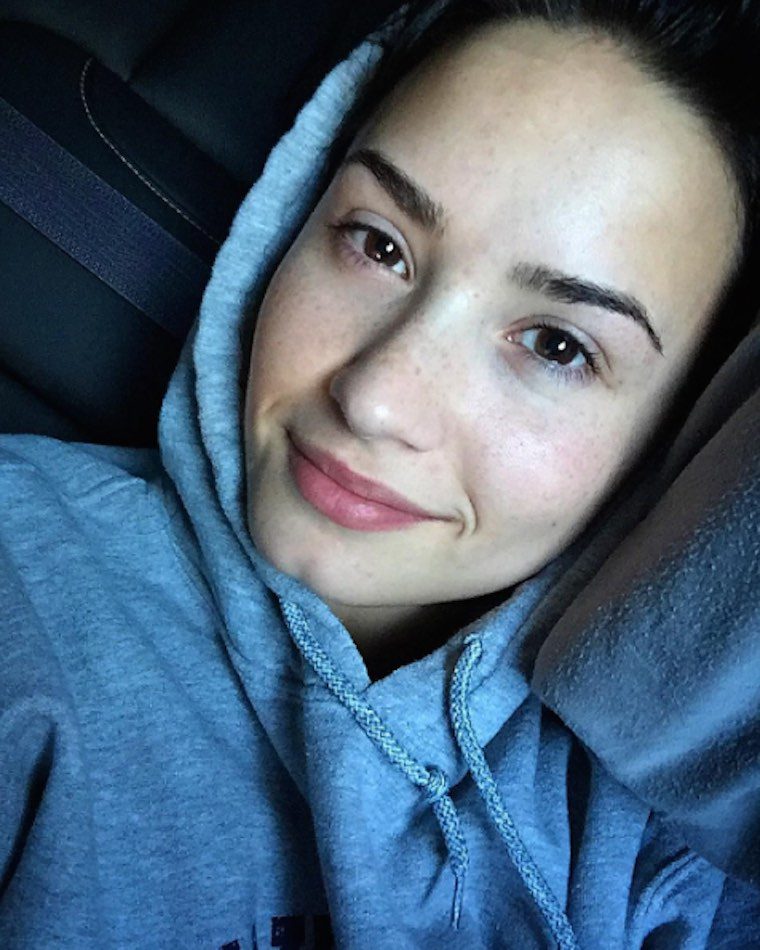Ten years ago, mental health was something few people talked about in the public eye—unless you count the faux-concerned speculation that followed outbursts like Britney Spears' shaved-head, caught-on-film breakdown. But lately, it seems there's a new openness about the topic from stars of all stripes (be it Selena Gomez, Lady Gaga, Demi Lovato, or Amanda Seyfried), making it okay—and even encouraged—to be vocal about issues like depression and anxiety.
"There's a cultural movement going on in terms of transparency and authenticity," says Katrina Gay, national director of communications and public affairs at National Alliance on Mental Illness (NAMI). "As more celebs come out and get a supportive response, it's encouraging other people to do so, too—and the truth is, people need support and understanding to be their best selves."
"There's a cultural movement going on in terms of transparency and authenticity."
The Good Place star Kristen Bell has emerged as one of the most badass voices out there, talking openly about what it's like to live with depression ("you feel like there is no sunlight around you, or you are paralyzed with fear" she said in a YouTube video last year), and encouraging others to get help. The response? "Almost on a daily basis I hear that that was impactful," she tells Well+Good.
"I present a very bubbly persona and I feel I have a responsibility to round out the story and tell people what actually happens in a human being’s life, that nobody is always happy. There are certainly days where I feel awful, or I’m crying, or I’m irritable. And there are ways to get yourself out of it—there are thousands of ways," she notes.
She's right: One in five adults in the US deal with mental health issues—so to treat these issues as taboo not only seems outdated, but unfair.
So what's fueling today's keep-it-real era of mental health? And what impact does it have on those who aren't household names? Here, we investigate.

Hollywood is no longer encouraging silence
Gay points out that until recently, actors and actresses couldn't admit that they had a mental health condition—it would inhibit their chances of getting work and lead to some seriously exploitative press coverage. Gay cites Spears as a perfect example: "It was unsupportive and unhealthy how she was treated by the media."

{{post.sponsorText}}
Just as today it's socially acceptable to chat with your friends about holistic ways to improve mental health (like diet, mindfulness, and supplements), so too has there become more openness among stars.
Today, celebs like Kristen Stewart are talking to reporters about their challenges (in her case, debilitating anxiety and panic attacks that began at age 15). And people are giving celebs slack and realizing that they're taking breaks to work on their wellness, according to Gay.

Your inner critic is (hopefully) giving you a break
There's more to this than just positive press for the starlet in question; seeing celebs get real about their issues on TV and through social media can help others let go of what Gay calls the internal stigma, "which is when we're judging ourselves and rejecting our own self as being 'less than' because we have this struggle. And I'm seeing that shifting."
Holistic psychiatrist Meredith Bergman, MD, says this is happening in her New York City practice as well. "Celebrities coming forward about their mental health issues helps to disseminate information to a wide audience and also serves to dissolve some of this stigma. This can diffuse shame and inspire people to come forward and ask for the help they need."
Bell, in her typical no-nonsense way, thinks it's strange that depression and anxiety would ever be hidden from view. "It's a brain-functioning issue, and you want people to get the help where they need it," she says. "Mental health should be like going to the dentist."

Knowing you're not alone gives you courage
The ongoing public conversation surrounding mental health has important implications. "[Mental illness] can be incredibly isolating, and very hard to deal with alone," explains Gay. "The role of community and support is oftentimes what makes the difference."
Dr. Bergman agrees, noting that celebs "have a platform and voice to educate the public about mental health disorders and empower people who might not otherwise seek medical care. I can't say that it's ultimately related, but I have received more referrals than ever of young women who are finally ready to face eating disorders, PTSD, bipolar disorder, depression, alcoholism, and panic disorders."
And as long as the positive dialogue surrounding mental health continues, Gay believes that it helps. "It needs to be part of the conversation," she adds. "The consequences of not doing so are tremendous. Sixty million Americans are impacted—that's a lot."
Being honest is its own way of advocacy, after all. So here's to mental health realness—with no secrets and no shame. Because as Bell points out, "Would you ever deny a diabetic his insulin? Then why would you ever deny someone who is in need of mental health help any help at all? It doesn’t make sense."
Ellie Goulding is another star whose frankness is helping shed light on anxiety—here, she writes about how fitness helped her panic attacks. And did you know that depression and anxiety affect the body differently?
Loading More Posts...